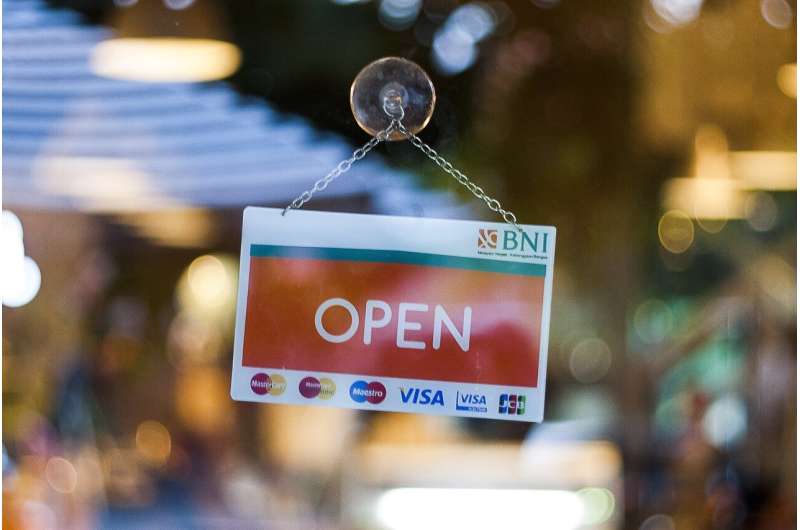Science
Retail Workers Seek Solutions to Combat Customer Abuse

More than 1.4 million people work in the retail and fast food sectors in Australia, but many face a troubling reality. A recent union survey found that **87%** of retail workers experienced verbal abuse from customers in **2023**, a statistic that has remained consistent since **2016**. The rise in these incidents is alarming; in **2023**, **76%** of those abused faced such mistreatment on a daily, weekly, or monthly basis, compared to **54%** just two years prior.
As the holiday season approaches, concerns about customer aggression escalate. In response, a coalition of retail groups launched the “Be Kind in Retail” campaign, which calls on shoppers to practice compassion during this busy time. While this initiative aims to foster a more positive environment, research suggests a low-cost solution may also help reduce instances of customer abuse.
Introducing the Under Badge Concept
In late **2017**, the Shop, Distributive and Allied Employees’ Association (SDA) introduced the “No One Deserves a Serve” campaign to tackle the rising tide of abuse directed at frontline workers. A key component of this initiative involved the distribution of **500,000** adhesive plastic “under badges.” These badges were designed to be attached below existing name badges and feature short, personal messages such as “I’m a mother” or “I’m a son.”
The initiative gained traction in **2020**, when **Gary Mortimer**, the lead author of a recent study, noted his daughter wearing one of these under badges while working at a supermarket. Despite the widespread implementation, there has been limited research into the effectiveness of such personal identifiers in reducing customer aggression.
Insights from Recent Research
A study published in late **2024** involved interviews with **17** supermarket employees who participated in the “No One Deserves a Serve” campaign. While some workers felt awkward donning phrases like “I’m a son,” most reported that the under badges helped diminish verbal abuse and encouraged more empathetic interactions with customers.
One **39-year-old** worker recounted a memorable interaction where a customer, initially confrontational, softened upon seeing her badge that identified her as a mother. The customer started sharing stories about his own children, transforming the encounter from hostility to understanding. Another **22-year-old** worker felt that the badges helped customers see them as equals, rather than just employees.
The research continued with two experiments involving **940** customers. In the first scenario, participants were presented with a fictional retail experience that incited anger, paired with images of workers wearing either just a name badge or an additional under badge. Customers exhibited a statistically significant decrease in their intentions to engage in verbal abuse when the workers displayed personal identifiers.
In a second experiment with **340** different customers, the message on the under badge was altered to read “I’m a local.” The findings reaffirmed that any form of self-disclosure can mitigate aggressive customer behavior.
Theories of social interaction shed light on these outcomes. Social penetration theory suggests that deeper connections are formed when individuals share personal information, leading to greater empathy. Similarly, social exchange theory posits that when the perceived rewards of an interaction outweigh its costs, a more positive exchange occurs. In the case of retail interactions, customers who learn something personal about a worker may view them as more human, rather than merely a representative of the retail brand.
While the number of under badges observed in stores has decreased over the years, the SDA confirmed they are still distributed and available for use. The cost of producing these badges is remarkably low, ranging from **17 cents** each for larger orders to **43 cents** for smaller quantities. This minimal investment could be crucial in fostering a culture of respect and equality within retail environments.
As the holiday season approaches, implementing simple solutions like the under badge could play a significant role in improving the safety and well-being of retail workers across Australia. By encouraging customers to recognize the humanity of those serving them, the retail industry can work towards a more respectful and compassionate atmosphere.
-

 Science3 weeks ago
Science3 weeks agoInventor Achieves Breakthrough with 2 Billion FPS Laser Video
-

 Health3 weeks ago
Health3 weeks agoCommunity Unites for 7th Annual Into the Light Walk for Mental Health
-

 Top Stories3 weeks ago
Top Stories3 weeks agoCharlie Sheen’s New Romance: ‘Glowing’ with Younger Partner
-

 Entertainment3 weeks ago
Entertainment3 weeks agoDua Lipa Aces GCSE Spanish, Sparks Super Bowl Buzz with Fans
-

 Business3 weeks ago
Business3 weeks agoTyler Technologies Set to Reveal Q3 Earnings on October 22
-

 Health3 weeks ago
Health3 weeks agoCurium Group, PeptiDream, and PDRadiopharma Launch Key Cancer Trial
-

 World3 weeks ago
World3 weeks agoR&B Icon D’Angelo Dies at 51, Leaving Lasting Legacy
-

 Entertainment3 weeks ago
Entertainment3 weeks agoMother Fights to Reunite with Children After Kidnapping in New Drama
-

 Health3 weeks ago
Health3 weeks agoNorth Carolina’s Biotech Boom: Billions in New Investments
-

 Entertainment3 weeks ago
Entertainment3 weeks agoRed Sox’s Bregman to Become Free Agent; Tigers Commit to Skubal
-

 Science3 weeks ago
Science3 weeks agoNorth Carolina’s Biotech Boom: Billions Invested in Manufacturing
-

 Top Stories3 weeks ago
Top Stories3 weeks agoFormer Mozilla CMO Launches AI-Driven Cannabis Cocktail Brand Fast









